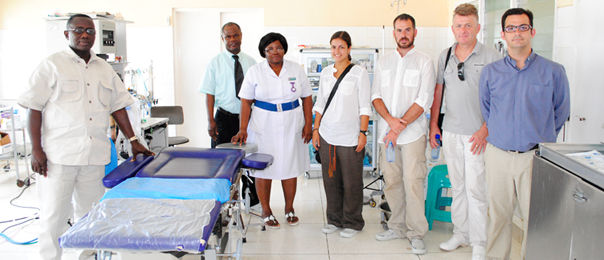 The University of Cape Coast Directorate of Health Services (DUHS) has assured the University Community and the general public that efforts have been made to guard against the spread of the Ebola Viral Disease (EVD) by reinforcing prevention of infection and control practices in the University.
The University of Cape Coast Directorate of Health Services (DUHS) has assured the University Community and the general public that efforts have been made to guard against the spread of the Ebola Viral Disease (EVD) by reinforcing prevention of infection and control practices in the University.
The University of Cape Coast admits students from Ghana and other foreign countries in Africa and beyond and there have been fears that some of the UCC students especially those from West African countries where the disease is prevalent may spread it when the university reopens for the 2014/2015 academic year. In order to control and manage such cases on campus, the Central Administration through the University Health Services organised a sensitization programme to educate members of the university community on the Ebola Viral Disease.
Delivering a presentation on the disease, a Senior Pharmacist of the University Hospital, Mr. Joseph Kizzie-Hayford outlined some of the measures the university has put in place to prevent the disease from spreading even before the students report to campus. He further pointed out that the DUHS would soon set up an isolation centre to keep suspected patients of the disease before transferring them to the appropriate facilities for treatment.
On the prevention of the disease, Mr. Kizzie-Hayford said members of the university community must observe personal hygiene such as routine washing of hands; refraining from eating bush meat such as chimpanzees, bats, antelopes and grasscutters. He also advised people not to be shaking hands and other forms of body contact with infected persons. He also cautioned against coming into contact with dead bodies infected with the EVD.
He recalled that Ebola is a severe acute viral disease that first appeared in 1976 in two simultaneous outbreaks, in Nzara, Sudan, and in Yambuku, Democratic Republic of Congo.
Since the outbreak of the disease in recent times more than 1,000 people have died, with Sierra Leon, Guinea and Liberia being the worst-affected and two deaths in Nigeria.
Ebola is introduced into the human body through close contact with the blood, secretions, organs or other bodily fluids of infected animals. Infection has been documented through the handling of infected chimpanzees, gorillas, fruit bats, monkeys, forest antelope and porcupines found ill or dead or in the rainforest.
Ebola also spreads in the community through human-to-human transmission, with infection resulting from direct contact through broken skin or mucous membranes with the blood, secretions, organs or other bodily fluids of infected people, and indirect contact with environments contaminated with such fluids. Burial ceremonies in which mourners have direct contact with the body of the deceased person can also play a role in the transmission of Ebola. Men who have recovered from the disease can still transmit the virus through their semen for up to 7 weeks after recovery from illness.
source: ucc.edu.gh





